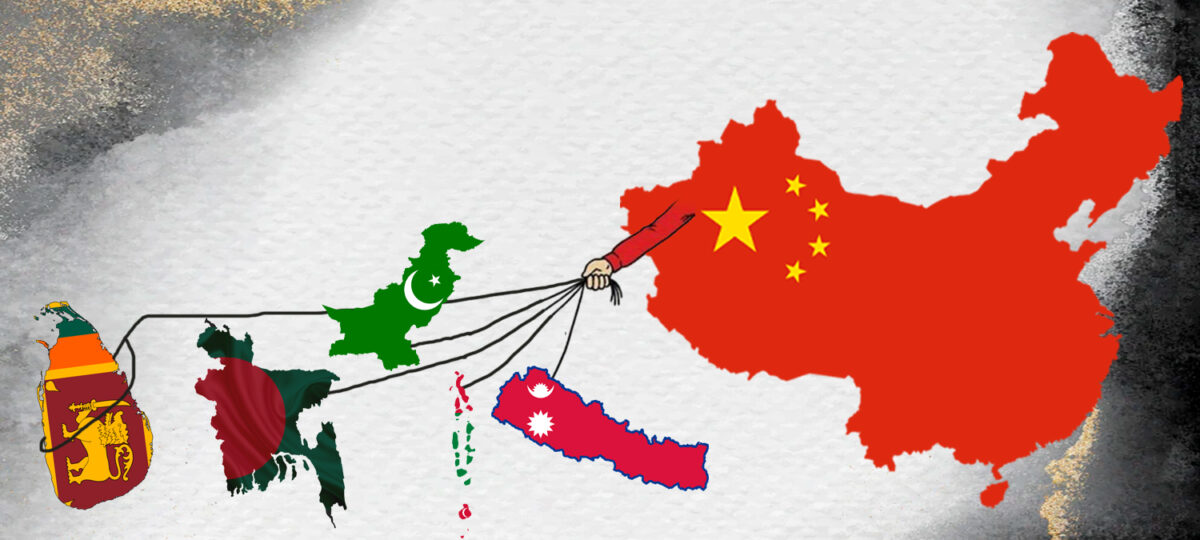Table of Contents
In recent years, China’s expanding influence in South Asia has raised profound concerns regarding its impact on the sovereignty, stability, and long-term interests of nations like Pakistan and the Maldives. Through a comprehensive analysis of China’s investments, infrastructure projects, and diplomatic overtures, it becomes evident that Beijing’s actions often carry significant risks and trade-offs for its partners.
China’s Belt and Road Initiative (BRI) has emerged as a defining feature of its global ambitions, encompassing vast infrastructure projects and investment initiatives across continents. While positioned as a pathway to development and connectivity, the BRI’s impacts vary significantly across regions and nations. f Pakistan and the Maldives, have found themselves increasingly under China’s strategic orbit. Despite their unique geopolitical contexts, both nations face similar challenges stemming from their deepening ties with Beijing. What initially may seem like a boon for economic growth and development often reveals itself as a complex web of dependencies and vulnerabilities with far-reaching implications for sovereignty and stability.
China’s Economic Grip
At the forefront of Beijing’s engagement with Pakistan and the Maldives lies its formidable economic influence, manifested through massive investments and infrastructure development projects. In Pakistan, the China-Pakistan Economic Corridor (CPEC) stands as a flagship BRI endeavor, promising significant investment in transportation, energy, and telecommunications infrastructure. However, closer scrutiny reveals concerns regarding the terms and conditions of these investments, with critics warning of the potential for debt-trap diplomacy and long-term economic entanglement.
Similarly, in the Maldives, Chinese investments have surged in recent years, fueling ambitious infrastructure projects ranging from ports and bridges to airports and resorts. While these investments may offer short-term economic benefits, questions persist regarding their sustainability, transparency, and long-term implications for the Maldivian economy.

Sovereignty Erosion
Beyond the realm of economics, China’s influence extends into the political and diplomatic spheres, raising concerns about sovereignty erosion and undue external influence. In Pakistan, the close strategic partnership between Beijing and Islamabad has led to increased military cooperation and political alignment, raising questions about Pakistan’s ability to pursue independent foreign policy objectives. Moreover, Beijing’s growing presence in key sectors of the Pakistani economy, coupled with its expanding footprint in the country’s territorial waters, has raised concerns about the erosion of Pakistan’s sovereignty and the potential for undue influence over its domestic affairs.
Similarly, in the Maldives, Chinese investments in critical infrastructure projects have been accompanied by growing political influence, with Beijing leveraging its economic clout to shape political decision-making and policy outcomes. This has led to growing apprehensions among Maldivian citizens and regional stakeholders about the erosion of national sovereignty and the potential for external interference in domestic affairs.
Regional Destabilization
Perhaps most concerning is the potential for Beijing’s actions to exacerbate regional tensions and destabilization in South Asia. In Pakistan, China’s close ties with Islamabad have exacerbated existing tensions with neighboring India, fueling geopolitical competition and strategic rivalry in the region. Moreover, China’s expanding presence in the disputed territories of Gilgit-Baltistan has further complicated regional dynamics, raising concerns about the potential for conflict escalation and insecurity along the India-Pakistan border.

Similarly, in the Maldives, China’s growing influence has raised alarm bells among neighboring nations about maritime security, territorial integrity, and the potential for regional power dynamics to shift in Beijing’s favor. This has prompted calls for greater regional cooperation and strategic alignment to counterbalance China’s growing assertiveness and ensure stability in the Indian Ocean region.
As China’s influence continues to expand in South Asia, the risks posed by its exploitative grip on countries like Pakistan and the Maldives cannot be overlooked. While economic engagement with China offers opportunities for growth and development, it also carries significant risks and trade-offs for sovereignty, stability, and regional security. It is imperative for policymakers, stakeholders, and civil society actors in Pakistan, the Maldives, and the broader Indo-Pacific region to carefully evaluate the costs and benefits of their engagement with China and work towards fostering relationships that prioritize mutual respect, transparency, and sustainable development.
Failure to do so risks further deepening China’s chokehold and compromising the sovereignty, stability, and long-term interests of nations in South Asia and beyond. By shedding light on these dynamics and fostering informed dialogue, this article seeks to contribute to a more nuanced understanding of the implications of Beijing’s role for the region and the broader global order.



